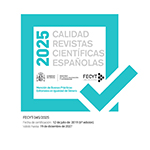The Declaración by Maestre Juan el Viejo
Resumo
The Declaración, by the converso Juan el Viejo, is an unpublished fifteenth century work in the genre of the Judeo-Christian polemic. It is not an indistinct miscellany but a highly structured work on a well defined text: Psalm 72, which it interprets verse by verse. The Declaración cannot be earlier than the same author’s Memorial. Views of Juan as “typical”, as a “type”, recall some of the problematics of converso typology since the nineteenth century. Most of the ideas from Christian sources in Juan seem to be conventional if not formulaic. Most readers of Juan avoid dealing with - the major consistent trait of his works- the Aramaic and Hebrew components; what Juan calls the “sabidores”. While there is the problem of unacknowledged intermediate sources there is also a proto philological bent in an author who avoids drawing purely on biblical translations and who confronts different versions. His Messianic/Christological bent is part of a tradition of reading that particular text but it coheres with his contemporaries’ predilections. Behind his arguments and formulations it is possible to detect unsuspected echoes of what he calls a life spent studying the “Old law”.
Downloads
##submission.format##
Licença
La revista En la España Medieval, para fomentar el intercambio global del conocimiento, facilita el acceso sin restricciones a sus contenidos desde el momento de su publicación en la presente edición electrónica, y por eso es una revista de acceso abierto. Los originales publicados en esta revista son propiedad de la Universidad Complutense de Madrid y es obligatorio citar su procedencia en cualquier reproducción total o parcial. Todos los contenidos se distribuyen bajo una licencia de uso y distribución Creative Commons Reconocimiento 4.0 (CC BY 4.0). Esta circunstancia ha de hacerse constar expresamente de esta forma cuando sea necesario. Puede consultar la versión informativa y el texto legal de la licencia.
La revista En la España Medieval no cobra por tasas por envío de trabajos, ni tampoco cuotas por la publicación de sus artículos.












